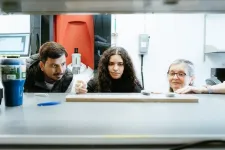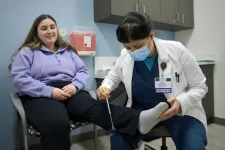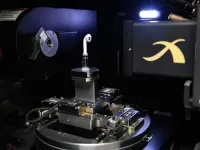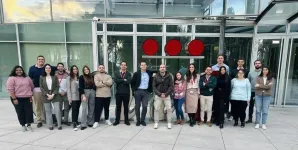(Press-News.org) Rice University physicist Emilia Morosan is part of an international research collaboration that has been awarded multimillion-dollar funding from The Kavli Foundation to develop and test next-generation superconductors through artificial intelligence and quantum geometry. This global initiative, spearheaded by Päivi Törmä of Aalto University in Finland, seeks to push the boundaries of quantum materials science and superconductivity.
The project includes funding from the Klaus Tschira Foundation and philanthropist Kevin Wells, fueling this ambitious effort to achieve new breakthroughs in quantum geometry in 3D materials. The researchers aim to develop superconductors capable of functioning at unprecedentedly high temperatures while advancing our understanding of the role quantum geometry plays in material design.
Morosan’s team at Rice, including graduate student Rose Albu Mustaf, research scientist Sanu Mishra and postdoctoral student Sajilesh Kunhiparambath, will focus on synthesizing and characterizing new materials as part of the SuperC consortium dedicated to the goal of achieving room-temperature superconductivity by the year 2033.
The promise of room-temperature superconductors
Superconductors hold the potential to revolutionize energy efficiency by transmitting electrical energy without resistance, minimizing energy loss. Current superconductors, however, require extreme cooling to temperatures between minus 150 C and minus 270 C, which offsets their energy efficiency benefits. Room-temperature superconductors could eliminate this hurdle, significantly enhancing energy efficiency in computing and beyond.
Superconductors work by forming Cooper pairs of electrons, enabling resistance-free current flow that contrasts with traditional conductors, where electrical resistance generates heat. Innovations in superconductivity could be transformative, especially as the energy demands of information and communication technologies continue to grow, contributing to global carbon dioxide emissions.
SuperC is addressing the challenge of advancing superconductivity through two groundbreaking approaches. The first, known as flat band superconductivity, involves investigating materials in which electrons are nearly immobile, a condition that enhances electron pairing and has the potential to increase superconducting temperatures — a phenomenon first observed in 2018 in twisted layers of graphene. The second approach employs AI-driven material discovery using machine learning to analyze vast combinations of materials and efficiently predicting those most likely to exhibit high-temperature superconductivity, streamlining the discovery process.
Morosan’s expertise in quantum materials
At the heart of this effort is Morosan’s work on materials design, synthesis and characterization. Her research explores the interplay between crystal structure, magnetism and superconductivity. Her lab employs advanced materials synthesis techniques such as crystal growth from molten fluxes, vapor transport and solid-state reactions coupled with detailed structural and physical property measurements.
“The design of high-temperature superconductors has been slow, primarily due to the extreme conditions — for example, pressure — required to stabilize some of these candidate materials,” said Morosan. “Using quantum geometry in 3D materials is a paradigm shift in the search for practical superconductors which not only have the high critical parameters — temperature, field, current — but also could be fashioned into wires or devices to enable applications.”
Morosan added that magnetism and superconductivity were traditionally thought to be mutually exclusive, but over the past 25 years, evidence has suggested that magnetic interactions could actually promote superconductivity, particularly in certain high-temperature superconductors like those containing copper or iron compounds.
“This research addresses three critical challenges in quantum geometry,” said Jeff Miller, nanoscience program officer at The Kavli Foundation. “We need more theoretical work to guide quantum geometry research, continued experiments in 2D materials like graphene and the discovery and synthesis of 3D materials exhibiting quantum geometry effects.”
Amy Bernard, vice president of science at The Kavli Foundation, emphasized the potential practical implications.
“The concept of quantum geometry could lead to significant advancements in superconductivity and other quantum effects,” Bernard said. “This research could uncover materials that dramatically reduce energy consumption in computationally intensive processes, which have far-reaching implications for addressing sustainability in the long term.”
The collaborative research team includes:
Milan Allan at Ludwig-Maximilians-Universität, München, Germany
Dmitri Efetov at Ludwig-Maximilians-Universität, München, Germany
Claudia Felser at Max Planck Institute for Chemical Physics of Solids, Dresden, Germany
Harold Hwang at Stanford University, USA
Miguel Marques at Ruhr University, Bochum, Germany
Emilia Morosan at Rice University, USA
Priscila Rosa at Los Alamos National Lab, USA
Päivi Törmä at Aalto University, Finland
The Klaus Tschira Foundation
The German foundation Klaus Tschira Stiftung supports natural sciences, mathematics and computer science and the appreciation of these subjects. It was founded in 1995 by physicist and SAP co-founder Klaus Tschira (1940-2015) by private means. Its three priorities are: research, education and science communication. This commitment begins in kindergarten and continues in schools, universities and research institutions throughout Germany. The foundation advocates the dialogue between science and society. Further information at: www.klaus-tschira-stiftung.de
The Kavli Foundation
The Kavli Foundation was established in 2000 by Fred Kavli, a Norwegian-American entrepreneur, to stimulate fundamental research in astrophysics, nanoscience, neuroscience and theoretical physics and to honor scientific discoveries with The Kavli Prize. Further information at: www.kavlifoundation.org
Kevin Wells
Kevin Wells is a committed environmental leader and science philanthropist. His recent science philanthropy is focused on providing seed funding to incubate new directions in scientific research and includes research projects in fundamental physics, quantum science and condensed matter physics. Wells also serves as executive chair of Environment Now, an activist foundation focused on safeguarding California’s natural environment.
END
Emilia Morosan on team awarded Kavli Foundation grant for quantum geometry-enabled superconductivity
Researchers are attempting to develop room-temperature superconductors, which would revolutionize energy efficiency
2025-02-04
ELSE PRESS RELEASES FROM THIS DATE:
Unlock sales growth: Implement “buy now, pay later” to increase customer spending
2025-02-04
Researchers from Imperial College Business School and University of Leeds published a Journal of Marketing study that examines the impact of BNPL installment payments on retail sales. The study, forthcoming in the Journal of Marketing, is titled “Buy Now Pay Later: Impact of Installment Payments on Customer Purchases” and is authored by Stijn Maesen and Dionysius Ang.
Buy-Now-Pay-Later (BNPL) is an increasingly popular payment method, allowing customers to spread payment into interest-free installments over a few weeks or months. Worldwide ...
Research team could redefine biomedical research
2025-02-04
Professor Leslie Wolf, a Distinguished University Professor and Ben F. Johnson Jr. Chair in Law at Georgia State University College of Law, is a part of a research team that has been provided $1.9 million to conduct research designed to increase participation in biomedical studies by involving participants in the research design process. The award has been approved pending completion of a business and programmatic review by PCORI staff and issuance of a formal award contract.
Wolf, along with colleagues at the ...
Bridging a gap in carbon removal strategies
2025-02-04
Biochar: bridging a gap in carbon removal strategies
As the world works to meet net-zero carbon goals, a new study offers a critical reminder: precision matters. The researchers suggest refining how we assess a natural carbon storage strategy to ensure the technology lives up to its potential as a climate change solution.
Biochar, a charcoal-like material derived from plant biomass, has long been hailed as a promising tool for carbon dioxide removal. However, a new study by Stanford researchers highlights a critical issue: current methods for assessing biochar's carbon storage potential may significantly undervalue its true ...
Outside-in signaling shows a route into cancer cells
2025-02-04
A new study shows how an anticancer drug triggers an “outside in” signal that gets it sucked into a cancer cell. The work, published Jan. 29 in Nature Communications, reveals a new signaling mechanism that could be exploited for delivering other drugs.
Many malignant cancers overexpress a protein called P-cadherin, which is embedded in the cell membrane. Because cancer cells have a lot of P-cadherin sticking out of their surface, the protein has been targeted for drug development.
Monoclonal antibodies against P-cadherin can carry a drug payload to the cancer cells. It has not been clear, though, exactly how the antibodies attach to P-cadherin ...
NFL wives bring signature safe swim event to New Orleans
2025-02-04
NEW ORLEANS, Feb. 4, 2025 — The American Heart Association, a global force changing the future of health, is promoting water safety, a multi-market priority initiative for the Off the Field National Football League Wives Association. The American Heart Association provided Hands-Only cardiopulmonary resuscitation (CPR) and automated external defibrillator (AED) education as part of the safe swim event held at Tulane University’s Reily Center on Tuesday, Feb. 4. The event welcomed nearly ...
Pickleball program boosts health and wellness for cancer survivors, Moffitt study finds
2025-02-04
TAMPA, Fla. (Feb. 4, 2025) — A new community-based pickleball program called Project Rally is helping cancer survivors improve their physical and social well-being, according to a recent pilot study led by researchers at Moffitt Cancer Center. The program, which is offered in partnership with the YMCA of the Suncoast, has shown strong results in terms of participation, enjoyment, and physical improvements.
Staying active is a key part of cancer survivorship care and research. Physical activity can help reduce the negative effects of cancer and its treatments, while also empowering survivors to live fulfilling lives. It offers many ...
International Alzheimer’s prevention trial in young adults begins
2025-02-04
The first participants in an international clinical trial aimed at preventing Alzheimer’s disease in young adults at high risk of the disease have been enrolled. The trial, led by Washington University School of Medicine in St. Louis, aims to determine whether stopping the early molecular changes that lead to symptomatic Alzheimer’s disease can prevent the disease from ever taking hold. The study is enrolling people as young as 18 who have few or no detectable Alzheimer’s-related molecular changes in their brains, up to 25 years before the expected onset ...
Why your headphone battery doesn't last
2025-02-04
Ever notice that batteries in electronics don't last as long as they did when they were brand new?
An international research team led by The University of Texas at Austin took on this well-known battery challenge, called degradation, with a twist. They're focusing their work on real-world technology that many of us use daily: wireless earbuds. They deployed x-ray, infrared, and other imaging technologies to understand the complexities of all the technology packed in these tiny devices and learn why their battery lives erode over time.
"This started with my personal headphones; I only wear the right one, and I found ...
Study probes how to predict complications from preeclampsia
2025-02-04
The existing prediction models for severe complications of preeclampsia are most accurate only in the two days after hospital admission, with deteriorating performance over time, according to a new study published February 4th in the open-access journal PLOS Medicine by Henk Groen of University of Groningen, the Netherlands, and colleagues.
Preeclampsia is a potentially life-threatening condition that can occur during pregnancy; of women diagnosed with preeclampsia, 5-20% will develop severe complications. Two existing PIERS (Pre-eclampsia Integrated ...
CNIC scientists design an effective treatment strategy to prevent heart injury caused by a class of anticancer drugs
2025-02-04
A team of scientists at the Centro Nacional de Investigaciones Cardiovasculares (CNIC), working in collaboration with international partners, has designed a strategy for preventing the cardiotoxic effects of anthracyclines, a widely used class of anticancer drugs. Cardiotoxicity is a frequent adverse secondary effect of cancer therapy with these drugs. The study, published in JACC: CardioOncology, demonstrates that treatment with the SGLT2 inhibitor empagliflozin can mitigate the cardiac injury associated with anthracycline therapy.
Anthracyclines are first-line medications in the treatment of cancer, but in 5% of patients their use is associated ...
LAST 30 PRESS RELEASES:
Stress-testing the Cascadia Subduction Zone reveals variability that could impact how earthquakes spread
We may be underestimating the true carbon cost of northern wildfires
Blood test predicts which bladder cancer patients may safely skip surgery
Kennesaw State's Vijay Anand honored as National Academy of Inventors Senior Member
Recovery from whaling reveals the role of age in Humpback reproduction
Can the canny tick help prevent disease like MS and cancer?
Newcomer children show lower rates of emergency department use for non‑urgent conditions, study finds
Cognitive and neuropsychiatric function in former American football players
From trash to climate tech: rubber gloves find new life as carbon capturers materials
A step towards needed treatments for hantaviruses in new molecular map
Boys are more motivated, while girls are more compassionate?
Study identifies opposing roles for IL6 and IL6R in long-term mortality
AI accurately spots medical disorder from privacy-conscious hand images
Transient Pauli blocking for broadband ultrafast optical switching
Political polarization can spur CO2 emissions, stymie climate action
Researchers develop new strategy for improving inverted perovskite solar cells
Yes! The role of YAP and CTGF as potential therapeutic targets for preventing severe liver disease
Pancreatic cancer may begin hiding from the immune system earlier than we thought
Robotic wing inspired by nature delivers leap in underwater stability
A clinical reveals that aniridia causes a progressive loss of corneal sensitivity
Fossil amber reveals the secret lives of Cretaceous ants
Predicting extreme rainfall through novel spatial modeling
The Lancet: First-ever in-utero stem cell therapy for fetal spina bifida repair is safe, study finds
Nanoplastics can interact with Salmonella to affect food safety, study shows
Eric Moore, M.D., elected to Mayo Clinic Board of Trustees
NYU named “research powerhouse” in new analysis
New polymer materials may offer breakthrough solution for hard-to-remove PFAS in water
Biochar can either curb or boost greenhouse gas emissions depending on soil conditions, new study finds
Nanobiochar emerges as a next generation solution for cleaner water, healthier soils, and resilient ecosystems
Study finds more parents saying ‘No’ to vitamin K, putting babies’ brains at risk
[Press-News.org] Emilia Morosan on team awarded Kavli Foundation grant for quantum geometry-enabled superconductivityResearchers are attempting to develop room-temperature superconductors, which would revolutionize energy efficiency





